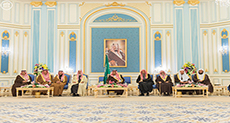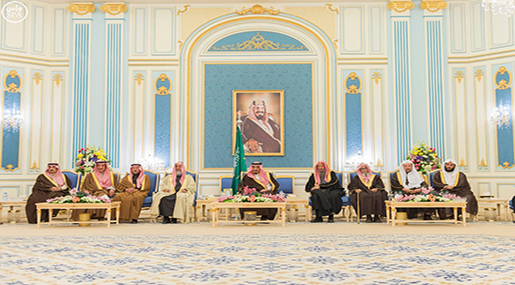What is Going on inside the al-Yamama Palace?

Hamza al-Khansa
Things are going on against the will of the family of Saud, which is submerged in several regional swamps. The open fields of struggle in Yemen, Iraq, Syria and elsewhere come up every day with catastrophic updates. And what made things worse is that the Iranian nuclear agreement entered into effect, and the EU, the US, and the entire world lifted economic sanctions imposed on Iran. Billions are heading towards the treasury of Tehran, while the Saudi treasury suffers from deficits. Some in Saudi Arabia still do not believe that the nuclear agreement between Iran and the P5+1 has indeed been implemented!

Speaking of the disputes between the brothers and grandchildren is no longer limited to some leaks and reports from here and there. Relations among the Saud family is getting worse every day as the Saudi political and financial losses emerge on the surface as a result of the ruling group's policies.
Sources informed with the Kingdom's situation told al-Ahed news website that the randomness in decision-making is dominant there. The sources confirm the leaks regarding disputes between the ruling parties. The Crown Prince Mohammad bin Nayef does not trust the Deputy Crown Prince Mohammad bin Salman. Competition is based on grabbing power, and making the important decisions. Sensing that the son of the king wants to get rid of the "strong" permanently exists, and is boosted by the approach between bin Nayef and the sons of the late King Abdullah, Mut'ab in particular, to guarantee their interests and presence.
Some results of randomness and competition came in the form of major decisions, the most prominent of which was the decision to assassinate Sheikh Nimr Baqir al-Nimr by execution. The same sources say that the hero of this decision is Mohammad bin Nayef, who aimed at causing tension among the extremists in the kingdom via a sectarian struggle with Iran on the one hand, and embarrassing the king and his son on the other hand, especially after the king had guaranteed some Arab and international sides that he will not perform the execution sentence against Sheikh al-Nimr. Bin Nayef, for early times, kept thinking that he is the favourite of the Americans due to his history with them. Finally, the Crown Prince, the Minister of Interior, started feeling that the Americans are dealing with the Deputy Crown Prince, Minister of Defense, as the man of decisions in the kingdom, although this treatment was already a matter of fact.
The most painful for the Saudis is their image in the eyes of their "arch-foe" Iran. The decision to open the door in front of confrontation with Iran occupies a wide area of arguments among Saudi princes. Exchanging accusations of failure in facing the "Iranian greediness" reached the point of doubting the reason of the timing of the campaign against Iran. In Saudi Arabia, some started doubting every decision. Those who doubt say that the timing of the attack on Iran is wrong because the Islamic Republic has been for months expecting the historic moment in which the lifting of sanctions would be announced, while they failed in hindering this achievement.
Atop of the Iranian rise, Saudi Arabia announced the new budget of 2016 with a deficit of 327 billion Riyals (some 87 billion dollars). As for Iran, speaking number wise, the nuclear agreement will let the Republic increase its production, and eventually exports, of oil with some one million barrels, in which the results of the game of decreasing prices would reverse from the perspective of Saudi Arabia.
According to internationally circulated figures, Iran will receive 400 million dollars of its frozen assets in the United States since the Shah era, in addition to 1.7 billion dollars of accumulated benefits on the original amount, and another 150 billion dollars locked in the western banks, not to mention the multiple of this amount that would be obtained from the expected investments, as well as the victories of allies in the Syrian, Iraqi and Yemeni fields. What concerns the decision makers in Saudi Arabia is that Iran, who has the fourth largest oil reserves in the world, and the second largest natural gas reserves, will be free to move in the global markets.
In the ruling family, some said that "our decisions are based on a nervous emotional reaction," rather than on a measured and strategic view. There is no difference whether this saying was based on a reaction toward the internal struggle on posts or not. The important point is that such words have begun echoing and establishing a rejection that would spread as "princely" blocs have begun emerging. The sons of the late kings, Abdullah in particular, feel that they are marginalized. The bloc of those marginalized from guaranteeing their interests has started to widen. Moreover, what is leaked in western reports and internal tweets regarding the king's intention to step aside in favor of his son Mohammad, in a move that transfers succession from the "brothers", sons of the founder Abdul Aziz, to the "sons" starting with his son Mohammad, all this boosts the feeling of being marginalized.
Source: al-Ahed News, Translated and Edited by website team
Comments




